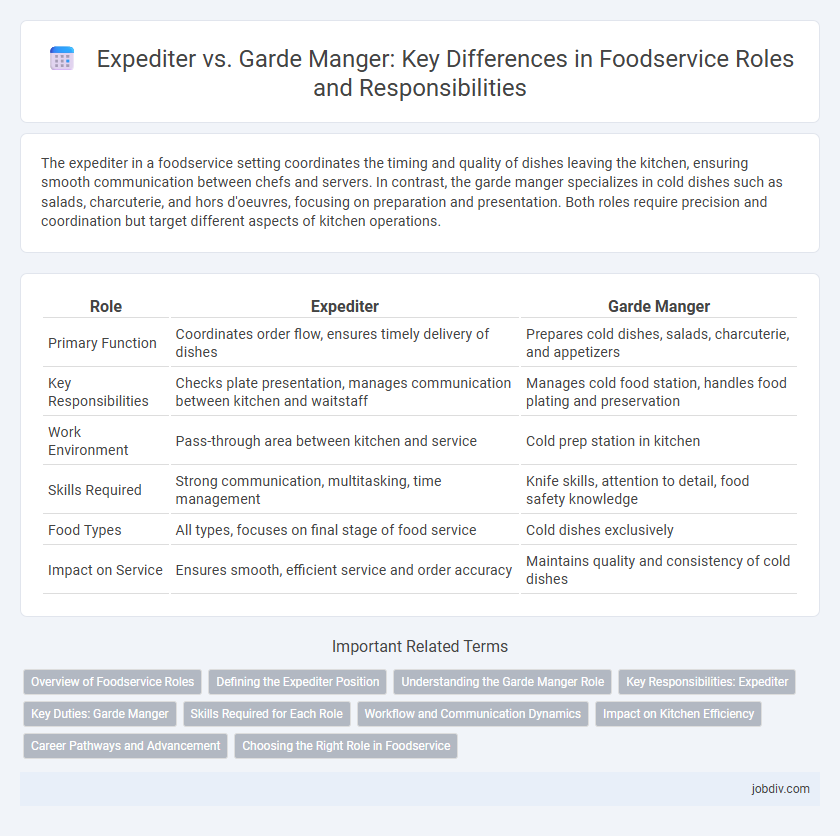The expediter in a foodservice setting coordinates the timing and quality of dishes leaving the kitchen, ensuring smooth communication between chefs and servers. In contrast, the garde manger specializes in cold dishes such as salads, charcuterie, and hors d'oeuvres, focusing on preparation and presentation. Both roles require precision and coordination but target different aspects of kitchen operations.
Table of Comparison
| Role | Expediter | Garde Manger |
|---|---|---|
| Primary Function | Coordinates order flow, ensures timely delivery of dishes | Prepares cold dishes, salads, charcuterie, and appetizers |
| Key Responsibilities | Checks plate presentation, manages communication between kitchen and waitstaff | Manages cold food station, handles food plating and preservation |
| Work Environment | Pass-through area between kitchen and service | Cold prep station in kitchen |
| Skills Required | Strong communication, multitasking, time management | Knife skills, attention to detail, food safety knowledge |
| Food Types | All types, focuses on final stage of food service | Cold dishes exclusively |
| Impact on Service | Ensures smooth, efficient service and order accuracy | Maintains quality and consistency of cold dishes |
Overview of Foodservice Roles
The expediter in foodservice ensures seamless communication between the kitchen and dining area, coordinating order flow and timing to maintain efficient service. The garde manger specializes in cold food preparation, handling salads, charcuterie, and cold appetizers with expertise in presentation and freshness. Both roles are vital for maintaining order accuracy and quality in a restaurant's kitchen brigade system.
Defining the Expediter Position
The expediter in foodservice acts as the critical liaison between the kitchen and the dining area, ensuring smooth communication and timely delivery of dishes. This role requires exceptional organizational skills to coordinate orders, manage kitchen flow, and maintain quality control before plates reach customers. Unlike the garde manger, who specializes in cold dish preparation and presentation, the expediter focuses on the overall efficiency and service pacing within the kitchen environment.
Understanding the Garde Manger Role
The Garde Manger plays a crucial role in foodservice by specializing in cold dishes such as salads, charcuterie, and appetizers, ensuring freshness and presentation excellence. Unlike the Expediter, who coordinates the timely delivery of orders between the kitchen and dining area, the Garde Manger focuses on meticulous preparation and creative assembly of chilled foods. Mastery of cold food techniques and strong organizational skills define the Garde Manger's contribution to maintaining kitchen efficiency and menu diversity.
Key Responsibilities: Expediter
The expediter in foodservice coordinates communication between the kitchen and front-of-house, ensuring timely and accurate order delivery. Key responsibilities include monitoring order progress, prioritizing tickets, and verifying meal presentation before service. This role demands strong organizational skills and the ability to manage multiple tasks to maintain efficient kitchen flow and customer satisfaction.
Key Duties: Garde Manger
The Garde Manger specializes in preparing cold dishes such as salads, charcuterie, pates, and hors d'oeuvres, ensuring ingredients are fresh and presentation is visually appealing. They maintain proper food safety standards while managing inventory for cold storage and organizing mise en place for efficient service. Their expertise in knife skills, ingredient knowledge, and artistic plating is crucial to uphold the quality and consistency of all cold food offerings.
Skills Required for Each Role
An expediter requires strong communication skills, quick decision-making abilities, and exceptional multitasking to coordinate between kitchen staff and servers efficiently. A garde manger demands expertise in cold food preparation, knife skills, artistic plating, and knowledge of food safety regulations specific to salads, charcuterie, and appetizers. Both roles benefit from attention to detail and the capacity to work under pressure in a fast-paced foodservice environment.
Workflow and Communication Dynamics
The expediter coordinates kitchen workflow by managing order timing and ensuring seamless communication between the front of house and kitchen staff, optimizing meal delivery speed. In contrast, the garde manger specializes in preparing cold dishes, maintaining precise organization within the cold station to support efficiency and quality control. Effective communication between the expediter and garde manger is crucial for synchronizing tasks and preventing delays in service.
Impact on Kitchen Efficiency
An expediter streamlines kitchen operations by coordinating order flow and ensuring timely communication between the front of house and kitchen staff, which minimizes errors and speeds up service. In contrast, a garde manger specializes in cold food preparation, maintaining consistency and quality in dishes such as salads, pates, and appetizers, reducing bottlenecks in this station. Efficient collaboration between the expediter and garde manger enhances overall kitchen productivity and service speed, directly impacting customer satisfaction and operational workflow.
Career Pathways and Advancement
Expediter roles in foodservice prioritize coordination and timing, enhancing skills in communication and kitchen operations critical for advancing into management positions such as kitchen manager or executive chef. Garde Manger specialists develop expertise in cold food preparation, plating, and charcuterie, offering pathways toward roles in culinary arts, menu development, or specialized chef positions. Both career tracks provide foundational experience, but the expediter route often leads to leadership roles faster due to its operational intensity and interaction with multiple kitchen stations.
Choosing the Right Role in Foodservice
Selecting the right role in foodservice depends on balancing the fast-paced coordination skills of an expediter with the culinary creativity and cold kitchen expertise of a garde manger. Expediter positions emphasize order accuracy, timely communication between kitchen and front-of-house, and efficient plating under pressure. In contrast, garde mangers specialize in preparing salads, charcuterie, and cold dishes, requiring strong knife skills and an eye for presentation, making this role ideal for those passionate about detailed food preparation and artistry.
Expediter vs Garde Manger Infographic

 jobdiv.com
jobdiv.com